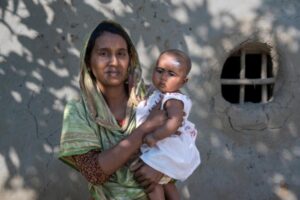
Bangladesh’s nutritional and health status of maternal and children is a serious concern. A summary of the unique circumstances surrounding mother and child health in Bangladesh and associated problems. This is a short review that includes an overall analysis and description of the literature on the health of mothers and children in Bangladesh’s general population. The data showed that, at least in recent years, Bangladesh’s rates of baby, child, and maternal mortality have gradually decreased.
In comparison to the previous 20 years, it is discovered that newborn mortality has decreased 2 times. Also, child mortality has decreased 6 times, and the mortality rate for those under five has decreased 3 times. However, it is highlighted that the circumstances behind maternal assassination have not decreased.
Understanding the health of mothers and children is crucial for schooling. Although different, the health knowledge index greatly improves the health of mothers and children. It is evident that one of the main causes of Bangladesh’s high rates of maternal and infant mortality as well as morbidities is poverty.
One of the key concerns is still the need for socioeconomic assistance for Bangladeshi rural residents. Despite a variety of challenges, Bangladesh has recently been successful in reducing the overall number of deaths linked to malnutrition and childhood, but the state of maternal health is not improving at the same rate. Politicians, as well as nongovernmental and government-funded groups, ought to step up and launch some successful initiatives to fully resolve the issue in Bangladesh.
Overview of Maternal and Child Health in Bangladesh
Child health status in Bangladesh
Income poverty and household food insecurity are two of the fundamental predictors of child health. The infectious environment that children are exposed to and, consequently, their risk of contracting diseases, are determined by water, sanitation, and health services. Disease and infection are harmful to children’s health and should be regarded as a contributing cause of child mortality [Table 1]. It is also well recognized that a lack of certain essential micronutrients, which are necessary for a child’s physical and mental development, is frequently linked to undernutrition in children. Iron, zinc, iodine, and vitamin A are the main micronutrients.


Child Nutrition and Feeding Practices in Bangladesh
In Bangladesh, caregivers often start complementary feeding either too early or too late. Because of this, many children receive insufficient micronutrients. Research shows that better dietary diversity increases nutrient intake. Limited food variety worsens micronutrient deficiency, which contributes significantly to child health problems.
Acute respiratory infections and diarrhea cause nearly two-thirds of child deaths in Bangladesh. Although most mothers initiate breastfeeding, about 70% do not exclusively breastfeed for the first six months. Cultural beliefs, economic hardship, and environmental conditions influence this practice.
Maternal Health Status in Bangladesh
Maternal health strongly affects child health outcomes. Adolescent girls face a higher risk of poor health during pregnancy. Poor maternal health influences fetal growth and increases the risk of lifelong health problems for children. These negative effects often continue across generations.
Low maternal nutrition contributes to moderate and severe acute undernutrition in children. Children with low birth weight often experience wasting and frequent illness. In Bangladesh, teenage girls and pregnant women show high rates of malnutrition. About one-third suffer from low BMI and anemia.
Studies confirm that maternal health affects fetal size and child growth. In urban areas, many pregnant women suffer from anemia and Vitamin A deficiency. Children born to mothers younger than 18 or older than 34 face a higher risk of undernutrition. Children of healthy mothers show lower rates of underweight.
Research and Development in Maternal and Child Health (MCH)
Several institutions conduct research and development on maternal and child health in Bangladesh. These include:
-
National Institute of Population Research and Training
-
Bangladesh Institute for Promotion of Essential and Reproductive Health Technologies
-
Association for Prevention of Septic Abortion
-
International Centre for Diarrhoeal Disease Research
Most of these organizations depend on donor funding. International partners such as WHO, UNICEF, UNFPA, UNDP, World Bank, ADB, and DFID actively support infrastructure development, policy making, and technical assistance.
Conclusion
Bangladesh has improved maternal and child health indicators over recent decades. However, women still face high risks of maternal death and illness. Child health conditions also remain poor.
Cultural barriers and weak socioeconomic support continue to affect maternal and child health. Policymakers must evaluate and strengthen current strategies. Government and non-government organizations need to expand awareness campaigns. The government must allocate special funding and authority for this work.
Further research remains essential to address these challenges fully.
For more information, please contact us.



